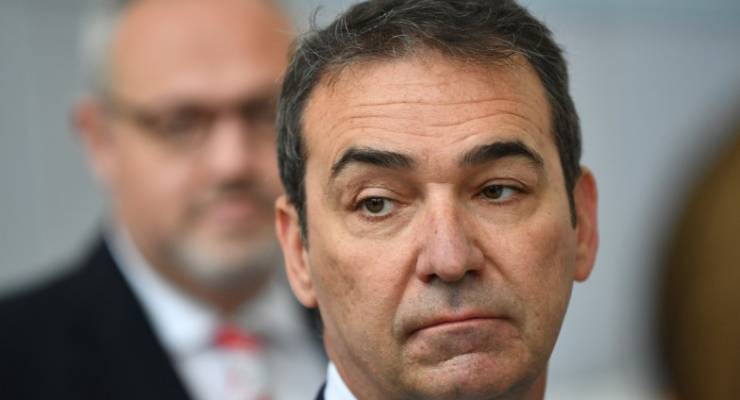
You know how a small tickle in the throat can rapidly turn into a full-blown, respirator-assisted hospital stay in these medically challenging times? The same thing happens in politics, even in largely COVID-free South Australia.
This outbreak of scandal began in June with the publication of an investigation by the ABC’s Patrick Martin and Nick Harmsen into the living arrangements of state parliamentarian Terry Stephens.
They published evidence that Stephens, the president of the Legislative Council, had not paid land tax on his property in Adelaide’s upscale suburb of Norwood, which is perfectly legal if it’s one’s primary residence.
Yet at the same time, he was claiming country members accommodation allowance as he ostensibly lived in an apartment in the sleepy beachside town of Victor Harbor, an hour or so down the Fleurieu Peninsula.
So where exactly was he living?
Handled well, it could have been knocked on the head. But after a week of non-answers, an admission from Premier Steven Marshall that he’d picked Stephens up for events from his Norwood home, and an online ad for Stephens’ supposed Victor Harbor pad as a short-term holiday rental, even the normally sympathetic Advertiser started publishing front-page stories on the matter.
When people waiting in line at the servo know you’ve been a bit sneaky with your benefits, you know the game is up.
And once that was out in the open, other MPs found they’d accidentally made perfectly understandable accounting errors. Infrastructure Minister Stephan Knoll agreed to pay back $29,000 for his country members accommodation allowance payments from December 2018; Primary Industries Minister Tim Whetstone was on the hook for about $7000 from 2012 to the present; backbencher Fraser Ellis coughed up $42,130 in incorrectly claimed remuneration.
Then another story broke, this time around Trade Minister David Ridgeway who admitted he’d signed blank timesheets for his chauffeur in 2016 so other Liberal MPs could use his driver while he was on holiday.
Knoll and Ellis were very forthright in explaining the issue was in the lack of clarity in the Renumeration Tribunal’s guidelines, including such murky legalese that members must incur “actual expenditure” in order to claim the allowance. And fair enough too. How could anyone possibly parse out what that was intended to mean?
Under pressure from Labor and the media, Knoll, Whetstone and Ridgeway resigned from their portfolios on Sunday and Stephens agreed to step down from the speaker’s role — thus creating a headache for Marshall who was forced to hastily reshuffle his ministry.
According to InDaily he’s been dealing with “factional brawling” (which he has denied) over the replacement for Knoll as the only right-winger in cabinet. The reshuffle has completely snubbed the dominant conservative right faction, with lower house speaker Vincent Tarzia and moderate first-term MPs Stephen Patterson and David Basham elevated to the frontbench.
So on the one hand, there are a lot of ministers with zero experience. But on the other hand, Marshall has guaranteed a bunch of internal turf wars. So … um, great?
Still, while there’s never a great time for a massive government scandal in which three frontbenchers have resigned under an expenses controversy, the political fallout will probably be negligible.
Marshall’s response to the COVID-19 pandemic — hard border closures, early rollout of testing, scrapping plans to privatise the state pathology service — has been well received locally so far, and the Liberals’ electoral future rest far more upon the state’s ability to keep case numbers down than whether his party have been rorting the heck out of their expenses.
And while Knoll is regarded as a rising star and a potential premier, some time in the wilderness won’t hurt his long-term chances. That’s because recent federal history suggests that the public’s memory for ministerial scandals is remarkably porous.
After all, the Turnbull government lost three ministers in quick succession in February 2016 — Mal Brough (over misleading parliament in the Peter Slipper affair), Jamie Briggs (over “inappropriate behaviour” towards a DFAT employee in Hong Kong) and Stuart Robert (over giving an official-looking speech for a pal-slash-donor signing a deal with a Chinese government resources company) — and then went on to win an election that July.
And while Brough and Briggs bowed out of politics, Robert was right back on the frontbench under Scott Morrison and is currently even rumoured to be the next Home Affairs minister despite a string of crises in his current portfolio.
The next South Australian election will be held in March 2022, which is eons away in vote-years. If Marshall gets a second term, it’s hard to imagine Knoll won’t be back on the frontbench.
The only wrinkle is that the matter is now before the SA Independent Commission Against Corruption — a problem with which federal parliament conveniently doesn’t have to contend.
One imagines that Marshall is keen to get any official investigation done and dusted well before they start budgeting for corflutes.








Great article as always Andrew. Rorting seems to be the Liberal Party’s favourite pastime. It’s beyond me how people keep voting for them.